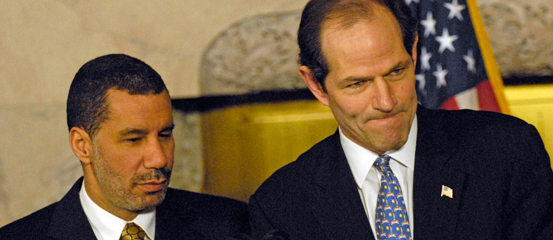Grasso Speaks Out
Former NYSE Chairman Richard Grasso has an impassioned column in WSJ defending his innocence and denouncing his critics, including New York Attorney General Eliot Spitzer, who is suing him for making too much money.
I must admit that this one strikes me as even more bizarre than the Martha Stewart case. It’s bad enough to be charged with covering up a crime with which you’re not charged; how in the world can you be charged for taking a pay raise that’s legally offered to you by your board of directors?
Update: Steve Bainbridge has an interesting post on the topic, complete with some suggestions for reforming the NYSE.
Update: Kevin Drum wonders whether I’ve read anything about the charges. I’ve read some NYT reports and heard about a lot of it on NPR but haven’t conducted any in-depth investigation. Still, the whole concept of the case seems odd to me.
NYT business writer Floyd Norris is a little less emphatic than I am but seems to agree: Claims Against Grasso Aren’t as Clear Cut as They May Seem [RSS]
But some of Mr. Spitzer’s claims will be difficult to prove, and last night he appeared to back away from one of the most explosive accusations against Mr. Grasso – that as chairman and chief executive of the Big Board he knew of fraud by research analysts and failed to act against it.
The complaint includes accusations that Mr. Grasso intervened in the exchange’s regulatory processes and in those of other regulators to get favorable treatment for companies run by directors of the exchange. It contends that those directors, mostly top executives at major Wall Street firms, rewarded Mr. Grasso with compensation that Mr. Spitzer views as outrageously high.
But the issue may not be that clear-cut. The suit claims that most of the exchange’s directors were misled about what Mr. Grasso was being paid, particularly in regard to pension benefits that made up a large part of his $187.5 million pay package over a multiyear period. It names only one director – Kenneth G. Langone, who served as chairman of the board’s compensation committee during the time Mr. Grasso’s pay skyrocketed – as having acted improperly.
Yesterday’s story reporting the charges: New York Sues Ex-Head of Big Board Over Pay Package [RSS]
The 52-page complaint filed in New York State Supreme Court by Mr. Spitzer paints a harsh picture of Mr. Grasso, with new evidence contending that he inflated his pay and deliberately misled his high-powered board about many details of his package to enhance his pay above and beyond a benchmark of comparable chief executives.
Although the other board members of the exchange voted for Mr. Grasso’s pay package, the suit is narrow in focus, naming only one other defendant — a former director, Kenneth G. Langone, who is a friend of Mr. Grasso and was the chairman of the compensation committee from June 1999 to June 2003, the years when Mr. Grasso’s annual pay peaked.
Mr. Grasso, who has vociferously defended his pay as fair given the success of the exchange during his tenure as chairman from 1995 until he was forced out last fall, said in a statement: “I’m disappointed that New York’s attorney general has chosen to intervene in what amounts to a commercial dispute between my former employer and me. I look forward to a complete vindication in court.”
In what could help his case against Mr. Grasso, Mr. Spitzer also disclosed that Frank Z. Ashen, the internal compensation expert at the Big Board, has decided to cooperate with authorities, agreeing to pay back $1.3 million of compensation he received. Among the new evidence presented yesterday was a statement from Mr. Ashen, a 25-year employee at the exchange, that Mr. Grasso did not disclose to the board $18 million of bonus payments. Mr. Spitzer said that the cooperation of Mr. Ashen, who originally was going to be named as a defendant in the suit, was crucial in putting the case together.
“There is a simple reality here,” Mr. Spitzer said. “Mr. Grasso was paid too much. He has the money in his checking account and he has an obligation to return it.” Mr. Spitzer reiterated his assertions that Mr. Grasso’s pay was unreasonable for the head of a quasi-public institution like the stock exchange. Mr. Grasso’s total compensation was actually close to $200 million, Mr. Spitzer noted, including an additional $48 million in future compensation that Mr. Grasso agreed to forgo when he left the exchange.
The problem is, of course, what’s too much? I understand that NYSE is a non-profit, but I’m unaware of any regulatory limit on what CEO’s can make in non-profits. Maybe there should be one as a requirement for getting special tax breaks. But it’s unclear how we can impose them ex post facto. I’m unconvinced that any wrongdoing was done in setting the level here. The rest of the charges seem to amount to the existence of a good ol’ boy system in the NYSE. I had pretty much always presumed that to be the case.
NYT has the text of the case in PDF format.
This handy graphic gives a visual illustration of the rise in Grasso’s compensation. It’s too wide to copy into my screen and shrinking it will distort it.





I’d be getting pretty nervous if I were Alex Rodriguez right now . . .
Heh. Good point. Although the case against Derek Jeter would be easier to make right now.
Um, did you actually read anything about Spitzer’s case? It’s not exactly airtight, but it’s not exactly bullshit either.
How unamerican of you James–
I mean, the guy made a lot of money, obviously he should be charged with something.
It’s a good thing he didn’t put panties on anybody’s head, they’d be calling for the electric chair.
As somebody in the M&A field, I can say that too many of the jew bankers have too much say in our markets. They don’t mind making their money, but hate it when somebody else makes some.
My first take on this issue mirrored yours — i.e., if that was the contract that he was offered…how many of us would look at a salary offer and say — geez, that’s way too high, you’re offering to over pay me.
But upon reflection, I think there are two points. When does the compensation become so outlandish that the whole package becomes suspect? And what is the person really agreeing to do for such a “payoff”?
Second issue — A case against Grasso allows Spitzer to depose other “knowledgeable sources”: I’m sure there is a wealth of info to be had.
Keep in mind — under Grasso and his Board of Directors, the operation was corrupt. Or do you think it was not?
Aaron, with an attitude like yours, how can you stand to have that name?
—